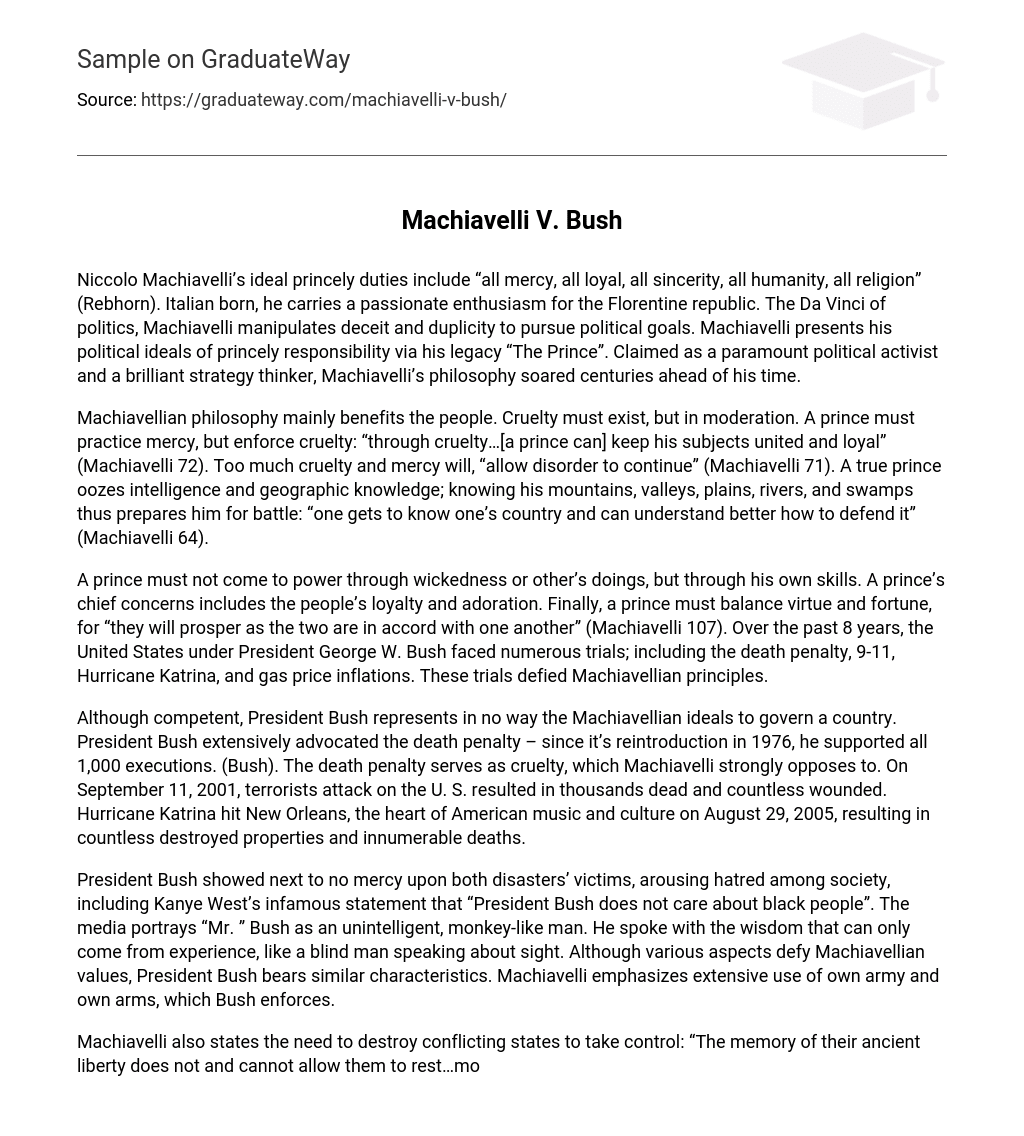Niccolo Machiavelli is an Italian who passionately supports the Florentine republic. He believes that a prince should possess qualities such as mercy, loyalty, sincerity, humanity, and religion, as stated in the book “The Prince.” Machiavelli is considered a genius in political strategy and manipulation, earning him the title “The Da Vinci of politics.” His philosophy and ideas ahead of his time have made him a prominent political activist throughout the centuries.
According to Machiavelli, being Machiavellian is advantageous for the people. It is crucial to embrace cruelty moderately. A prince should display both mercy and cruelty as it fosters unity and loyalty among his subjects. Nevertheless, an excess of either will result in ongoing disorder. An authentic prince exhibits intelligence and a comprehension of geography, encompassing mountains, valleys, plains, rivers, and swamps. This understanding aids him in warfare by enabling him to effectively protect his nation.
Machiavelli argues that a prince should not use evil means or rely on others to acquire power, but rather depend on their own abilities. It is crucial for a prince to prioritize gaining the loyalty and adoration of the people. Additionally, a prince must strike a balance between virtue and fortune as they will prosper when these two factors are in harmony (Machiavelli 107). However, President George W. Bush’s eight-year tenure saw the United States confront numerous challenges that contradicted these Machiavellian principles. These challenges encompassed issues such as capital punishment, the 9-11 attacks, Hurricane Katrina, and escalating gas prices.
Despite President Bush’s competence, he fails to embody the Machiavellian ideals of governance. He has consistently supported the death penalty and backed all 1,000 executions since its reintroduction in 1976 (Bush). However, Machiavelli vehemently opposes this practice, considering it a form of cruelty. Furthermore, the United States suffered a catastrophic terrorist attack on September 11, 2001, resulting in the loss of thousands of lives and countless injuries. Additionally, Hurricane Katrina devastated New Orleans on August 29, 2005, causing extensive property damage and claiming numerous lives.
President Bush’s lack of compassion for the victims of both disasters has sparked widespread hatred, exemplified by Kanye West’s infamous statement that “President Bush does not care about black people.” The media often portrays him as an unintelligent and monkey-like individual. Despite his unconventional traits, President Bush shares similarities with Machiavelli’s values. Machiavelli stresses the importance of wielding one’s own army and weapons, a philosophy which Bush adheres to.
According to Machiavelli, it is necessary to destroy opposing states in order to gain control: “The memory of their ancient liberty does not and cannot allow them to rest…most secure way is to destroy them” (Machiavelli 23). In pursuit of their natural resources, Bush destroyed homes in Afghanistan and Iraq. Furthermore, Bush implemented the no child left behind program, showcasing benevolence, a value that Machiavelli emphasizes repeatedly. While Machiavellian principles and democracy may differ, they do share certain similarities. Specifically, Machiavelli rejects citizen political participation and majority rule.
Both laws aim to benefit the people, safeguard their rights, and enable them to choose their own representatives. President Bush’s policies diverge greatly from Machiavelli’s political ideology. Machiavelli rises above the misconceptions surrounding great figures in history, significantly influencing all facets of contemporary politics.
Works Cited
“Bush Voices Death Penalty Support” International News. BBC News. Saturday, 3 Dec 2005. Retrieved on 17 Nov 2008.
Machiavelli, Niccolo. The Prince and Other Writings 1513, New York City, Waveland Press, Barnes & Noble, 2003.
Rebhorn, Wayne A. Ed. The Prince and Other Writings 1513, New York City, Waveland Press, Barnes & Noble, 2003.





